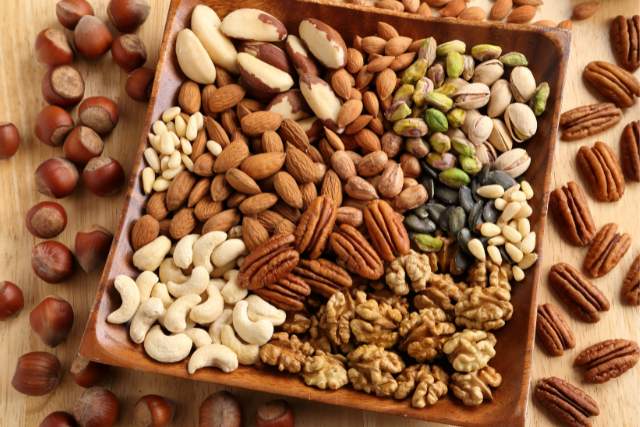Recent Posts
-

- Diabetes-Friendly Nutrition: Smart... 08.12.2024
-

- Nutrition for Chronic... 08.12.2024
-

- Anti-Inflammatory Diet: Food... 08.12.2024
-

- Low-Sodium and Heart-Healthy:... 08.12.2024
-

- Plant-Based Diets for... 08.12.2024
For the Love of Your Brain, Go Nuts!

You’ll surely be going nuts reading this article as we cracked the benefits of Nuts on your brain.
Even when you were a child, there is a good chance that you were exposed to the idea that eating nuts might cause you to forget what you have learned. However, it is different from the situation. A lot of individuals believe that consuming nuts is beneficial to the brain.
Consuming nuts significantly impacted life expectancy in recent primary research conducted at Harvard. Persons who consumed nuts regularly had a mortality risk that was 20% lower than that of persons who did not consume nuts, according to the findings of a study that included more than 100,000 individuals.
Another reason we should include some healthy nuts in our diet is that our bodies do not make many of these fatty acids, and the only way to obtain them is via our food, which includes a lot of critical fatty acids. Nuts have a lot of essential fatty acids, so eating them is the only way to get them. If you add nuts to your diet, you will likely consume less harmful foods, such as saturated fatty acids, as a result.
In addition, several gains in brain health, such as improved cognitive function, learning, memory, and improved mood, have been linked to the consumption of nuts.
The ability to think and reason
According to the findings of several studies, nut eating is connected with improved cognitive function. The researchers found that those participants who consumed the most nuts and had the highest overall nut intake throughout their lives saw the most advantages.
Anxiety and mental state
According to a systematic review conducted in 2022, a greater intake of nuts is connected with a lower risk of depression and an improved mood in the general population.
Consuming nuts has been linked to decreased depression in several well-designed studies, one of which was the SMILES intervention experiment. Nuts come in a variety of different shapes and sizes. Following dietary adjustment for twelve weeks (which included eating one portion of nuts daily), the rating of depression was observed to improve.
Understanding and recollection
According to the findings of research carried out in Spain, children whose mothers consumed more nuts during the first trimester of pregnancy obtained the highest levels of success on tests evaluating their cognitive function, attention ability, and working memory.
In addition, the children's cognitive development was evaluated when they were 18 months old, when they were five years old, and when they were eight years old. Those moms who reported eating the most nuts every week (an average of slightly less than three portions of 30 grams each) were the ones who saw the most benefits from eating nuts.
However, it is essential to remember that not all nuts have the same impact on our brains. Certain varieties of nuts may provide fewer health advantages, and the opposite may be true.
Walnuts
Walnuts are among the most beneficial types of nuts for the brain. Walnuts are an excellent source of DHA, polyunsaturated omega-3 acids, polyphenols, and vitamin E. Walnuts also have a high phenolic content. According to several studies, eating walnuts may significantly increase one's memory and cognitive abilities, all while reducing feelings of worry.
As it is beneficial for the brains of adults, docosahexaenoic acid (DHA) is also helpful for newborns' brains, which develop faster if their moms consume sufficient amounts. Consuming an adequate amount of DHA will provide some protection against the deterioration of brain health.
Almonds
These nuts have the greatest concentration of vitamin E, which has been linked to a reduction in memory loss and cognitive decline associated with aging, in addition to an improvement in language ability, and they are the source of this vitamin.
Almonds that have been roasted may be consumed on their own, or they can be combined with cereals or other dishes. Almond milk is delicious and nutritious and may be consumed in any manner you like best.
Peanuts
Niacin, also known as vitamin B3 or vitamin PP, is abundant in peanuts. Niacin is well-acknowledged as an essential component of neuronal growth and viability, and it is especially well-known for its function in mitigating the symptoms of neurodegenerative illnesses.
Niacin is known to raise levels of high-density lipoprotein while simultaneously lowering levels of low-density lipoprotein. Unhealthy cholesterol levels have been connected to amyloid deposition in the brain, which is associated with Alzheimer's disease. Niacin is known to reduce levels of low-density lipoprotein while simultaneously increasing levels of high-density lipoprotein.
Hazelnuts
Hazelnuts benefit the brain's health due to the high levels of vitamin E, manganese, thiamine, and folate they contain.
Evidence shows that vitamin E may protect against Alzheimer's, dementia, and Parkinson's disease by preventing cognitive loss as individuals age. It has been demonstrated that manganese may also increase brain activity connected to cognitive performance.
Thiamine is sometimes called the "nerve vitamin" because it maintains healthy nerve activity throughout the body and in cognitive processes. A lack of thiamine in the body may harm the brain. The abundance of fatty acids and protein found in hazelnuts contributes to alleviating depression.
Disclaimer: The information provided in this article is for general information purposes only. All information in this article is sourced from other websites, and we do not represent any rights regarding the contents and information on the site. All rights belong to their original owner.
Sources:
- Going Nuts for Brain Health - BrainHQ from Posit Science
- 5 Nuts For Brain Health (Makes You Smarter): Work Faster, Live Better | Vermi Food





